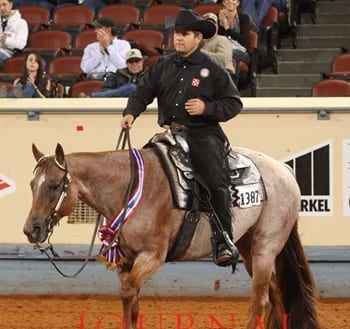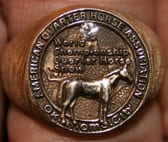When my Dad, Sid Griffith, got the call from
Alex Ross that he was being invited to judge the AQHA World Show this year, I
knew immediately that it would rank as one of the highlights in his professional
career. After getting his first
judge’s card with NRHA in 1970 at the tender age of 21, he has enjoyed the
privilege of judging most of the major events in reining. In 1975 he added an AQHA judge’s card
to his resume and since that time, he has enjoyed judging the Congress,
numerous majors, and abroad over the last 35 years. Although my Dad
is a private person behind the scenes, I know it meant a lot to him to be asked
to judge his first AQHA World Championship Show.
Although my Dad has had great
horses of every discipline along the way, he felt that hauling me non-stop over
the last seven years for Rookie and high point honors had really prepared him
well for the task. Most
significantly however, he attributes the fine-tuning of the AQHA judging system
over the years for really helping to properly prepare him for judging this
important major. “The system
itself,” he described, “has been overhauled significantly over the years and
the degree of difficulty has changed due to the quality of exhibitors and explosion
of specialized horses. Continuing to refine and create
judging systems to keep up with the specifics of specialty horses helps judges
to be more consistent as a whole.”
He recalls that helping to
develop the NRHA scoring system as a onetime NRHA Board member was also very
useful.
“Today, you have to stay current
by judging, exhibiting or training,” in addition to the seminars my Dad
believes. “Although I have
trained, ridden or judged every discipline, I find that need to continue to
educate myself by talking to specialists at every horse show I get to. Sort of keeping a finger on the pulse
of things. Open mindedness if an
important factor in being a good judge.
In the last seven years, I have been to more horse shows with Dakota
than I have probably been to cumulatively in my whole life. I have become a better judge by virtue
of hauling my daughter.” While
acknowledging that judging is an “individual opinion,” he feels the well organized
guidelines developed by AQHA definitely help to make your decisions.
Clearly the World Show left a
lasting impression on my Dad, and he described that the depth of quality of
horses and trainers was “amazing.”
I asked if he had any
first time jitters, and he thoughtfully said that “If you didn’t have at least
a little butterfly or two, that perhaps you weren’t taking the responsibility
seriously enough. Everyone that I judged with took it very seriously, and we
all felt it was an honor to be there…an honor that your association has chosen
you to officiate at the most prestigious event of making world champions. It is a privilege.” His biggest fear in judging was that he would miss something
with the incredible depth.
While my Dad said you have 15
days of pressure, that it was “Worrying about doing the best job that makes you
do the best job possible.” He
said his best feeling in hind sight was that he has “no regrets.” “In my own mind I did a fair assessment.” When I asked if there was added
pressure in judging well known horses that were past world champions, he was
quick to point out that “There were a lot of great horses that you admire at
the shows week in and week out who weren’t crowned world champions. At the end of the day, each horse had
to prove that they were deserving of the industry’s highest honor. Best set of horses you’ll ever look at in one
show. Best of the best of the best!”
So what is a typical day for an
AQHA World Show judge? Up around
5:30 a.m.; off to the arena at 6:50; arrive at 7:00; and hit the ground running. A major compliment that he made
numerous times was the integrity of AQHA.
Behind the scenes is a continuous process of judge’s meetings, educational
tapes before certain sessions, and discussions about what is expected. Each group of five judges meets together
with a representative of AQHA before their classes in order to re-enforce their
comprehensive and professional standards. When I asked my Dad whether or not he
felt he had judged anything differently after the daily judge’s meetings than
before, he felt that they “Made you more aware of the areas that needed to be
refined during the judging process.”
Judges are permitted to
walk through the trade show while accompanied by a chaperon staff member, and
spend time in the judge’s room while not working or preparing for their classes. Meals are served buffet style for all
staff which makes the whole day run smoothly.
O.K., now to the fun stuff! Since spouses and children of judges
are not permitted to attend the world show, I had to know important details
like the trends. My Dad said he
definitely noticed that black saddles with square corners were among the
strongest trends at the World Show along with saddles with black trim and
detailing.
 And what about
And what about
the horses? I had to know if there
was one go that he would always remember. Marking an
arena high score, and breaking her own arena record in the finals, Vital Signs Are Good was in his opinion the most memorable overall run while competing in
the senior western riding class.
Describing all the finalists as “YOW-ZA”, it was “The extension of her
front leg in her lead changes along with cadence and expression that were
positively phenomenal.” To be in
such deep water and stand out so significantly was mind boggling”. With sheer amazement, he described her
run as “Impressive.”
 Judging the world show is a tremendous
Judging the world show is a tremendous
honor, and does have its perks like the cool stuff my Dad brought home,
including a gold medallion world show ring for first-timers. We all got a kick when he
described it as his “Super Bowl” ring! In addition, each world show judge received the custom
world show leather jacket, a briefcase, judge’s folder, and signature “Q”
tie. His biggest tip for new judges
is to “Take a large wardrobe – I spent a lot of time ironing.” (I honestly have never seen my Dad with
an iron so that would have been an experience in itself.) As far as judge’s attire, in the
prelims you are permitted to wear your own choice of clothing, while in the
finals navy blazers and tan pants are required for women and men.
My Dad credits the highly
qualified AQHA staff and ring stewards for making the entire process run
seamlessly. His lasting impression
of judging his first world show?
“Across the board it was a quality set of horses. Horses as a whole were simply in
remarkable physical condition regardless of the discipline. Whether it was speed, roping, reining,
hunt seat, western, etc., the horses were just extremely attractive and in top
flesh.” Although it took my Dad a few days to catch up on his rest, I
asked if he would ever want to do it again. “In a heartbeat, in a
heartbeat!”
Vital Signs Are Good photo © The American Quarter Horse Journal








